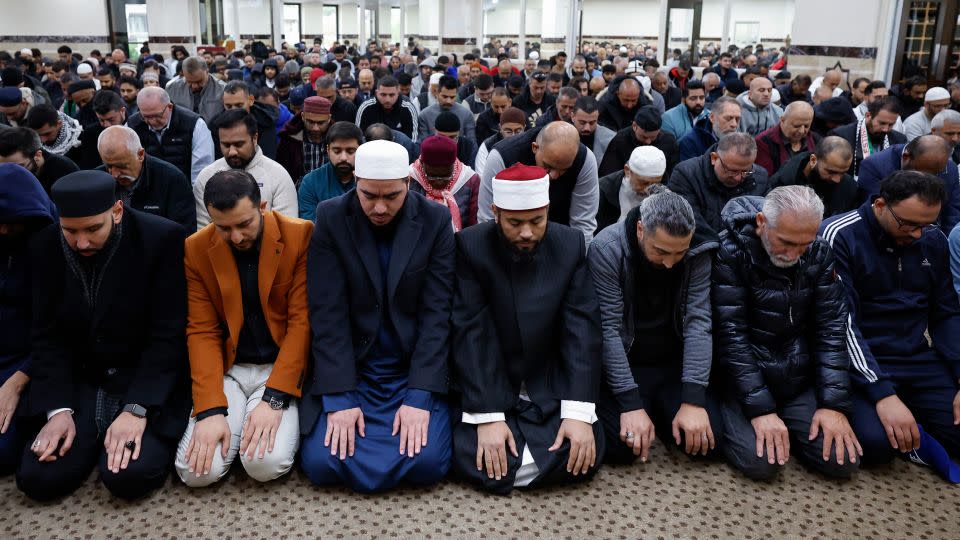‘Anxiety and fear are high:’ US Palestinians, Muslims fear a return to post-9/11 Islamophobia

As the Israel-Hamas War rages and the crisis in Gaza deepens, Taher Herzallah said he has exchanged frantic messages on social media with his family members who are trapped in Gaza.
Their description of the situation is grim. He said they’ve told him they have no food, electricity, water or fuel.
“When I spoke to them … they were basically saying, ‘We think this is it, we will not survive this one,’” he said. “You can only imagine what that feels like for Palestinian Americans who are getting these stories from their families right now.”
Herzallah said his concerns for his family thousands of miles away have also been compounded by a growing fear for the safety of his wife and children here in the US, as reports of attacks against people perceived to be Muslim or Palestinian surface across the country.
On Monday, family and faith leaders held a funeral for Wadea Al Fayoume, a 6-year-old Palestinian-American boy who was stabbed to death in his Chicago-area apartment Saturday in what the police say is an Islamophobic hate crime. Outside of Al Fayoume’s funeral at the Mosque Foundation in Bridgeview, Illinois, grief was tinged with anger.
Ahmed Rehab, executive director of the Council on American Islamic Relations Chicago chapter, said he views the attack against Al Fayoume and his mother, who is still hospitalized in serious condition, as an attack on all Muslims.
“It is our worst nightmare come true. It is something we tried to warn against, creating an atmosphere of dehumanization that puts our community at risk, creates sitting ducks,” he said.
“When this individual said, ‘You Muslims must die,’ this was a message not to the boy and the mother. This was to all of us. We were all stabbed that day.”
‘Dangerous narratives’
Leaders from Muslim, Arab, and Palestinian American groups told CNN in the days since Hamas’ surprise attack they’ve seen an increase in attacks reported against their communities, including vandalism, bullying at school and in the workplace, and threatening phone calls.
Linda Sarsour, a civil rights activist who is Palestinian-American, told CNN she has family in the West Bank, but she is even more worried about her community’s safety in the US.
“One of the things that’s always the saddest for me is when people start giving each other advice about not going out alone,” Sarsour said, adding people in her community are telling each other to be on alert and aware of their surroundings.
“People are mourning, people are scared … We are experiencing a lot of anguish, a lot of fear, and a lack of safety.”
In New York City, police have asked for the public’s assistance in locating a suspect who punched a 19-year-old bus passenger who was wearing a turban and a mask. The NYPD said it is investigating the assault as a possible hate crime after witnesses said the man attempted to remove the passenger’s turban.
And in Dearborn, Michigan – a city whose population is estimated to be about 42% Arab, according to the US Census Bureau – police arrested a man after he made online threats of violence against Palestinian American residents.
“Palestinian Americans and Muslim Americans feel like they are experiencing the level of hate and Islamophobia that existed after 9/11 and during the Iraq war – some say it’s even worse,” Aber Kawas, a member of the US Campaign for Palestinian Rights, told CNN.
Abed Ayoub, director of the American-Arab Anti-Discrimination Committee, said the perspectives of Palestinian and Muslim communities in places like the United States have been largely absent from the coverage of the Israel-Hamas conflict and that has allowed a growing atmosphere of bigotry and Islamophobia to go unchecked.
“There is no recognition of our existence. That’s what is allowing this to bubble,” he said. “And that’s what allowed a 6-year-old Palestinian boy to get stabbed to death in his own home.”
Ayoub said Arab and Palestinian communities are diverse and nuanced. But, he said, giving platforms to narratives that insinuate anyone who supports Palestine also supports Hamas and the violent attacks on Israel is problematic.
“Labeling everyone as Hamas just to justify the attacks is dangerous and we’re seeing that play out,” he said of the bombings in Gaza.
Last weekend, as Israel continued to bombard Gaza in response to the October 7 Hamas attack, activists staged pro-Palestine rallies in New York City’s Times Square and in cities across the country.
Many Muslim or Arab leaders say they feel compelled to speak out against the climate of Islamophobia to stem further violence.
“The CAIR NJ office has not received this many calls for help since the Muslim ban in 2017,” Selaedin Maksut, executive director of the Council on American Islamic Relations of New Jersey, said at a news conference Monday. “Anxiety and fear are high.”
Sarsour said a unified message from US officials would help address Islamophobia at home.
“You need leadership from both parties to get up and say it is not acceptable for us here in the United States to be engaging or allowing for any type of anti-Muslim, anti-Palestinian, anti-Arab sentiment,” Sarsour. “We stand united.”
CNN’s Celina Tebor, Chris Boyette, Keith Allen, Holmes Lybrand, Whitney Wild, Bill Kirkos & Carmaine Means contributed to this report.
For more CNN news and newsletters create an account at CNN.com

 Yahoo News
Yahoo News 
